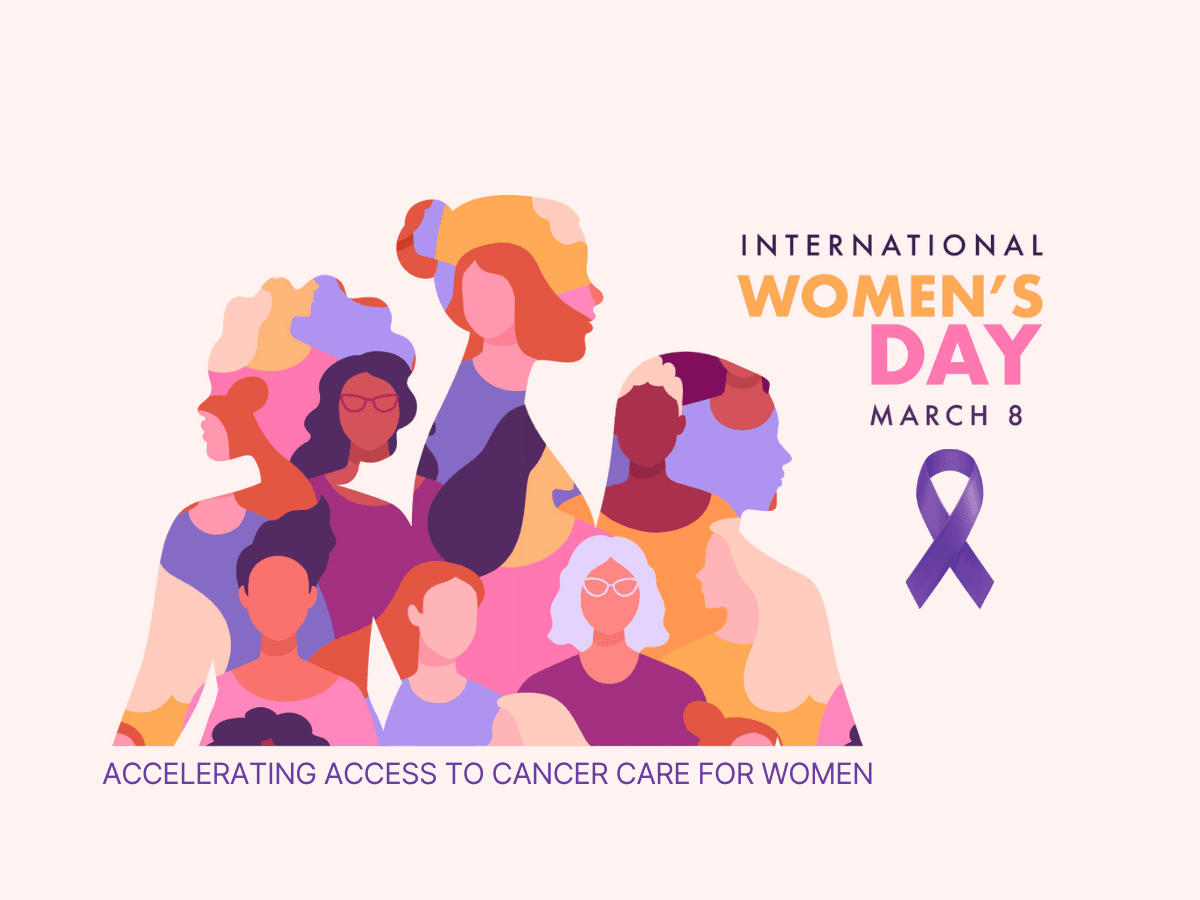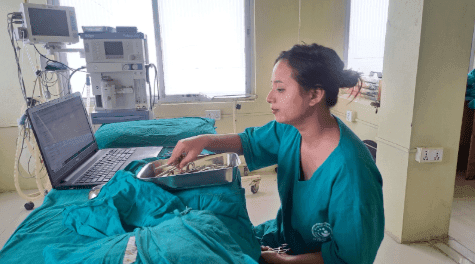International Women’s Day 2025: Accelerating Access to Cancer Care for Women

Author
Binaytara Team
In a new finding by the American Cancer Society, the rate of new cancer cases in women under 64 years old is now higher than in men. Furthermore, even though women in lower Human Development Index (HDI) countries are 50% less likely to be diagnosed with breast cancer than those in high HDI countries, they have a much higher risk of dying from it. This highlights a major cancer disparity and the need to improve access to cancer care for women—not only locally but worldwide.
March 8th marks International Women’s Day (IWD). IWD is celebrated annually to commemorate the advancement of women globally. With its history dating back to the 1700s, IWD encapsulates the struggles and victories of women through centuries to overcome and achieve equal access to education and opportunities. The remarkable global movement driven by the mission of IWD continues to gain traction in 2025 and beyond.
Among the many challenges women continue to face across different aspects of their lives, today we emphasize the importance of advocating for women’s health—specifically, access to cancer care and education. This disparity is particularly pronounced for women in low- to middle-income countries. Research shows that greater cancer awareness plays a key role in preventing and improving outcomes in these regions. This issue is also compounded by lower literacy rates in women compared to men. Therefore, it is crucial to accelerate global access to comprehensive cancer care, including prevention programs, education, and treatment.
Every year, more than 2,000,000 women are diagnosed with breast cancer or cervical cancer worldwide. However, one of the heartbreaking realities is that a woman's chances of survival can depend on where she lives, her socioeconomic status, and her cultural background. In addition to under-resourced healthcare systems, these factors often contribute to poor cancer survival outcomes. According to the American Cancer Society, cervical cancer is the leading cause of cancer death in women in 37 countries across sub-Saharan Africa and Latin America. Furthermore, the death rate from breast cancer in Ethiopia is twice as high as in the United States, despite a lower incidence rate in Ethiopia. Cultural beliefs surrounding cancer, such as viewing the disease as a punishment for past sins, may also play a role in these alarming cancer statistics. Since breast and cervical cancers are both highly preventable and treatable, improving education, raising awareness, and increasing access to care could significantly reduce cancer mortality in women living in low- and middle-income countries.
A major challenge for women in low- to middle-income countries in accessing quality cancer care is the lack of infrastructure. Cancer treatment is often long, complex, and costly, requiring a well-equipped healthcare system to support various treatment regimens and prevention programs. Unfortunately, many advanced cancer centers with the necessary resources are scarce in these regions, especially in rural areas. For instance, in Nigeria, staff shortages, equipment failures, and power outages have delayed the timely administration of radiotherapy, adding to the existing socioeconomic challenges patients face. Researchers suggest that breast cancer screening should only be prioritized when the healthcare system can properly treat diagnosed cases, including having trained specialists such as pathologists and radiologists.

Nurse in the Operation room managing procedure sets at Binaytara Hospital
This is why Binaytara established the Center for Women’s Cancer Access and Advocacy program. The program takes a comprehensive approach to improving women’s access to cancer care, providing not only preventive cervical cancer screenings but also chemotherapy services for women in rural Nepal. We are also building a world-class, 200-bed comprehensive cancer center to ensure women in these communities receive the full spectrum of care they need.
One of our specialists at Binaytara Cancer Center noted, “ It is evident that we need patient counseling sessions, a home hospice program, an effective palliative care unit, and caregiver counseling and education sessions. Additionally, we require trained professionals to run these programs and ensure their continuity. From cancer awareness for early diagnosis to ongoing support sessions for caregivers, it is crucial to provide uninterrupted programs that motivate and equip them to continue caring for their loved ones throughout their cancer journey.”
Considering the vast global inequities faced by women battling cancer, a collective effort must be made to bridge this gap. On a global and local level, several organizations are working to improve women’s health outcomes. The World Health Organization’s Women’s Health Strategy prioritizes maternal health, reproductive rights, cancer prevention, and overall well-being. Gavi, the Vaccine Alliance, plays a crucial role in preventing cervical cancer through HPV vaccination programs in low-income countries.
Similarly, Binaytara is committed to cancer education and advocacy to enhance access to women’s cancer care. Through partnerships with local communities, government entities, and healthcare institutions, we have been working to minimize cancer disparities. Yet, behind every statistic is a personal struggle.
Nandini, a patient at the Binaytara Foundation Cancer Center, has endured five cycles of chemotherapy and continues treatment, holding onto hope despite immense pain and fear. She stated, "My children love me. They take care of me. My daughters-in-law fed me with their hands when I was too weak to move. It does not hurt when I sit with people and talk. But when I am alone, the pain increases and goes beyond my tolerance." Her words are a stark reminder of the emotional, physical, and societal burdens women with cancer endure. It is not just about treatment. It is about dignity, compassion, and ensuring that no woman feels alone in her fight. And this is the gap Binaytara strives to bridge.
For International Women’s Day 2025, Dr. Fengting Yan, a renowned women’s oncologist at the Swedish Cancer Institute, highlighted the significant progress made in reducing cancer disparities, particularly in breast, ovarian, cervical, and endometrial cancers. She mentioned, “Over the past 50 years, she mentioned, breast cancer mortality has decreased by 58%, thanks to advancements in early detection, treatment, and awareness. Efforts to increase diversity in clinical trials have also improved, with organizations like ASCO working to ensure greater inclusion. At Swedish, clinical trials are made accessible to diverse populations by removing language and cultural barriers, reinforcing the importance of equitable cancer care for all women. And while there is still work to do, we are making meaningful progress.”
Dr. Yan further highlights the need for community education, and meeting underserved patient populations where they are. She noted, “Community education is just as crucial as educating physicians. While doctors play a key role in treating patients, they must also step outside the clinic to engage directly with the community. I do community outreach whenever possible, but time is often limited.”
This International Women’s Day, we must move beyond awareness and take action to accelerate access to cancer care for women. Policymakers must prioritize funding for cancer research, screening programs, and equitable healthcare policies that ensure no woman is left behind due to financial, geographic, or systemic barriers. Healthcare providers can commit to advocating for early detection, increasing participation in clinical trials, and addressing cultural and language barriers that often prevent women from receiving timely care. As individuals, we can raise awareness, support cancer organizations, and encourage our communities to participate in preventive screenings and advocacy efforts.
At Binaytara, we celebrate and recognize the urgency of closing gender disparities in cancer care by implementing a comprehensive approach that enhances women’s access to quality cancer services. Through our multifaceted efforts, we remain steadfast in our mission to reduce cancer disparities and improve health outcomes for all, especially for women and other underserved populations.
This International Women’s Day, let’s honor the strength of women like Nandini—women who fight, endure, and hope for a future where equitable cancer care is not a privilege but a universal right. Join the movement. Donate to Binaytara to support our Center for Women’s Cancer Access and Advocacy, our health camps providing free cervical cancer screenings in Nepal, our hospital treating women’s cancers, and our advocacy work with the government of Nepal to improve healthcare policies affecting women’s cancer care. Advocate, support, and take action to ensure that every woman, no matter where she lives, has the chance to survive and thrive.
Works Discussed
- International Women's Day. (n.d.). International Women's Day 2025. Retrieved February 20, 2025, from https://www.internationalwomensday.com/
- Torre, L. A., Islami, F., Siegel, R. L., Ward, E. M., & Jemal, A. (2017). Global Cancer in Women: Burden and Trends. Cancer epidemiology, biomarkers & prevention : a publication of the American Association for Cancer Research, cosponsored by the American Society of Preventive Oncology, 26(4), 444–457. https://doi.org/10.1158/1055-9965.EPI-16-0858
- Ginsburg, O., Bray, F., Coleman, M. P., Vanderpuye, V., Eniu, A., Kotha, S. R., Sarker, M., Huong, T. T., Allemani, C., Dvaladze, A., Gralow, J., Yeates, K., Taylor, C., Oomman, N., Krishnan, S., Sullivan, R., Kombe, D., Blas, M. M., Parham, G., Kassami, N., … Conteh, L. (2017). The global burden of women's cancers: a grand challenge in global health. Lancet (London, England), 389(10071), 847–860. https://doi.org/10.1016/S0140-6736(16)31392-7
- American Cancer Society. (2024). American Cancer Society releases latest global cancer statistics. Retrieved from https://pressroom.cancer.org/GlobalCancerStatistics2024
- Leng, J., Ntekim, A. I., Ibraheem, A., Anakwenze, C. P., Golden, D. W., & Olopade, O. I. (2020). Infrastructural challenges lead to delay of curative radiotherapy in Nigeria. JCO Global Oncology, 6, 269-276. https://doi.org/10.1200/JGO.19.00286